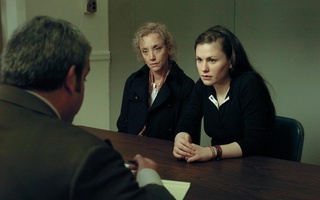What happens when two very different one-trick ponies co-star together in one movie? Pretty much what you’d expect, actually. “Identity Thief,” which opened Friday, is a vehicle for the boisterous Melissa McCarthy to torture the always dour Jason Bateman. And she does, for nearly two hours, with plenty of bodily humor to keep the movie entertaining in short, cringe-inducing bursts. However, the chemistry between the two never quite materializes, and these frequent pit stops aren’t enough to justify the movie’s 112-minute runtime.
Bateman plays his usual hard-luck character: a well-mannered businessman stuck in a mid-level job and surrounded by idiots. His character, Sandy Patterson, finally gets a chance at the VP job of a shiny new investment firm, but he is disgraced when his identity is swiped by a spa-loving convict—of what Patterson terms “Hobbit height”—living in Florida (McCarthy). In order to preserve his job, Patterson must travel from Denver to Florida to nab the thief and bring her back.
The chase ignores several easier fixes to the problem: why doesn’t Patterson cancel the credit cards? Surely the credit companies can get involved? But of course, a practical solution wouldn’t lead us to scenes like Patterson and his nemesis wrestling in a lavish Florida condo, with Patterson eventually smashing her over the head with a guitar.
And there’s plenty more where that came from. For better or for worse, the funniest parts of the movie come from McCarthy’s physical humor, which carried her through her breakout role in “Bridesmaids.” She drew snickers from the audience just by appearing on screen in a bright pink top, eyes bugging out, chubby arms full of cosmetics. She beats Bateman over the head with a flaming stick, has sex with reckless abandon, and gets catapulted into the air by a speeding car. Her complete commitment to these often uncomfortable physical roles deserves some amount of praise.
However, it’s too bad that director Seth Gordon has to rely so heavily on these visual gags to keep the movie humming. Bateman can be as witty as anyone in the business, but he doesn’t get lines that show off his expert deadpan delivery. The film sets and maintains a fairly low bar for comedy; for example, one of the principal recurring gags is that Sandy is considered a girl’s name. During the lulls in physical action, the dialogue feels like filler rather than comedic opportunity, making it hard not to empathize with Bateman’s exasperation that we haven’t arrived in Denver yet.
Further hurting the movie is its ridiculous drug dealer/bounty hunter side plot, in which a collection of buffoons with varying motives attempts to murder the two leads at every step. However, their presence is hardly explained or mined for any laughs. This classic trope can work if ridiculous enough—think Ken Jeong’s sneering Mr. Chow in “The Hangover”—but here, T.I. and Genesis Rodriguez crash on and offstage randomly, adding nothing to the action nor the comedy.
With each passing town, it becomes clear that McCarthy’s character—unnamed for most of the movie—has deep psychological problems that can be traced to her being abandoned as a baby and going through the throes of foster care. “Blame the system!” the movie seems to shout. Unfortunately, the morals are too little, too late, and out of place. Moreover, they seem to condone McCarthy’s drunk-driving, throat-punching, binge-spending ways, a very questionable takeaway point from a major motion picture.
In the concluding scene, Gordon finds the balance between sincerity and humor. A flash-forward shows Patterson and McCarthy’s character meeting again three years later. The dialogue is warm, fluid, and optimistic, and the two show a natural rapport. The movie could have ended there, but McCarthy promptly punches a woman who calls her “bitch” and gets tasered as M.I.A.’s “Bad Girls” jingles in the background. Perhaps this is Gordon’s way of acknowledging that the pairing doesn’t quite work—maybe it’s just better for McCarthy to take the spotlight and do her thing.
—Staff writer Andrew Chow can be reached at andrewchow@college.harvard.edu.
Read more in Arts
BCSM ConcertRecommended Articles
-
Students Design Slavery CourseA Sociology course about modern-day slavery designed by undergraduates will be taught next spring by Sociology Professor Orlando Patterson.
-
Sociology Department Calls for New HiresDespite an increase in concentrators, the number of faculty members in the Sociology Department has remained flat.
-
 ‘Margaret’ is an Overwrought Self-Mockery
‘Margaret’ is an Overwrought Self-Mockery -
Campus Political Leaders React to Polling Showing Government DistrustIn the wake of a New York Times/CBS poll that indicates that distrust in the federal government is at its highest recorded level, Harvard’s student political leaders say they share the public’s concerns. The national poll found that 89 percent of Americans do not think that they can “trust the government in Washington to do what is right,” and 74 percent think that the country is on the wrong track.
-
Students Go All Out for HalloweenDressed in an off-white billowy shirt, ripped up khaki pants, and a dirty blue vest, Sarina M. Patterson ’14 portraying Captain Jack Sparrow was a physical manifestation of the lively Halloween festivities that occurred on Harvard campus on Monday.
-
Kennedy School Professors Discuss Causes of Congressional GridlockDuring a panel discussion titled “Too Many Checks, No Balance: Partisan Brinkmanship or a Shrinking Presidency?,” Patterson and David King, a lecturer at the Kennedy School, discussed the roots of the current political gridlock and its impact on American society.













